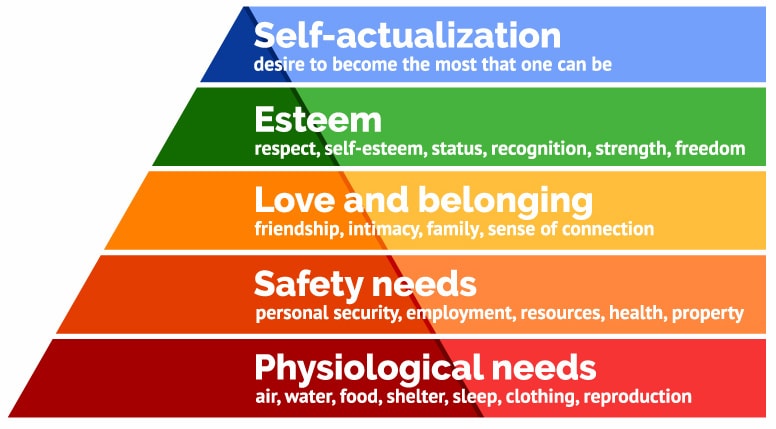
Self-actualization can be defined as the realization or fulfillment of one’s talents and potentialities, especially considered as a drive or need present in everyone. When it comes to emotional intelligence and leadership, it should be thought of as a leadership skill that requires, even demands, long-term development.
To explain it more fully; self-actualization refers to the need for personal growth and development throughout one’s life. Developed in 1962 by psychologist Abraham Maslow, it is the highest level of his hierarchy of needs; that is, the need for personal growth and discovery that is present throughout a one’s life. In other words, Self-actualized people are those who are fulfilled and doing all they are capable of.
In Maslow’s hierarchy of needs, human motivation is based on an individual’s ability to seek fulfillment and change through personal growth; and that, once a person’s lower-level needs have been fulfilled or satisfied, they would strive to satisfy higher-level needs.
For example, from the bottom of the hierarchy upwards, the needs are:
- Basic needs: physiological survival and physical safety
- Psychological needs: love, intimacy, and belonging
- Self-fulfillment needs: esteem and achievement, plus self-actualization and fulfillment
Needs lower down in the hierarchy must be satisfied before individuals can attend to needs higher up.
So, once you are self-actualized, you’ve met your full potential as an individual – and yet, for Maslow – a person is always “becoming” and never remains static, relative to growth and development toward one’s potential, or higher needs.
7 Characteristics of a Self-Actualized Person
A self-actualized person is someone who feels fulfilled and has accomplished all the things they are capable of accomplishing in their life through personal growth and peak experiences, which are moments of deep meaning or emotion.
Here are seven characteristics of a self-actualized person:
- Problem-centered (not self-centered)
- Perceive reality efficiently and can tolerate uncertainty
- Accept themselves and others for Who they are
- Highly creative
- Takes responsibility and works hard
- Strong moral/ethical standards
- Honest and unpretentious
And yet, one may ask, if becoming fully self-actualized is impossible, what is the point of trying?
To answer this question, one must remember that Maslow saw his hierarchy as a theory of personal motivation; that, to be a whole human being, each level of need must be satisfied and that the need to satisfy each subsequent level would follow naturally (though subjective and cultural influences may apply).
Stated simply: To live as a fully realized human being… What one can be, one must be.
Self-Actualization as a Leadership Skill
The realization that you have reached or are working toward reaching your full potential can be quite stimulating, motivating you to reach for even higher plateaus of excellence. The recognition of the same characteristic in others will enable you to motivate and lead them toward greater goals and fulfillment.
This is the type of self-actualization that motivates a leader to set higher goals for their teams; a level of emotional intelligence and leadership skills which, quite frankly, is found in far too few leaders.
Developing self-actualization as a leadership skill is an important part of the EQ-I model of emotional intelligence we focus on here. If you have found yourself struggling with your senses of self-regard, self-respect, and confidence, we offer the help you need to improve your leadership skills. If interested, let’s chat. Click here to schedule your FREE Discovery Call.
